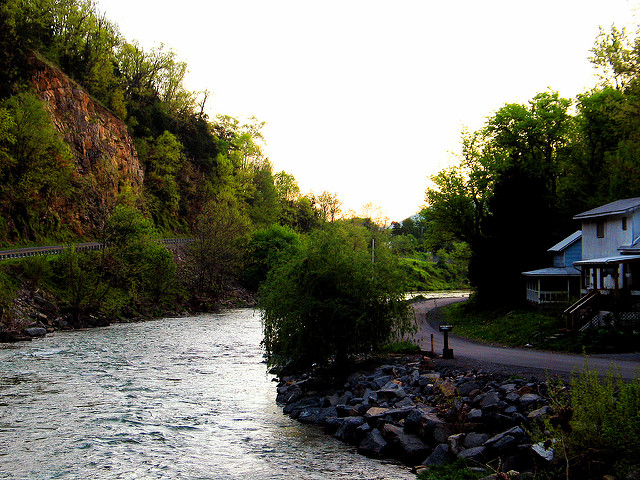
Before J.D. Vance’s Hillbilly Elegy, other Appalachians wrote memoirs to express their frustrations and reflections about the region. In 2001, John O’Brien’s At Home in the Heart of Appalachia did so from Pendleton County, West Virginia, in the “elbow” of the state’s Eastern Panhandle.
What O’Brien does best in At Home is explore how personal experience interacts with larger societal forces. He captures personal and class conflicts in Pendleton County and explores how place influences philosophy. Identity is at the core of his narrative: how O’Brien understands himself and his father, how he understands Appalachia, and how the people within it adopt or reject the identity they’ve been given.
O’Brien explored Appalachian identity through his relationship with his father and the choice O’Brien made to move his family to Pendleton County, where his father and wife grew up. He himself was raised in Philadelphia, but returned to the area often for family trips. After some years of jumping across America, he and his wife Becky move to Franklin, Pendleton’s county seat of 700 people.
However, At Home is carried by its themes more than a coherent or gripping plot. O’Brien recounts his experience of raising two young children in Franklin and the benefits and tensions that come with leaving a city for a small town. As the years go by, he discusses the estranged relationship he has with his father and the conflict between locals and the Woodlands Institute (something between a struggling folk school and a group of politically connected grifters). The resolutions to both are unsatisfying. A chapter on Hurricane Juan’s flooding in 1985 is gripping, but other chapters delve into economic and political history at odd points in the book. It’s a bit repetitive and not exactly a smooth read. Nonetheless, it’s refreshing to have an Appalachian book looking beyond coal country.
Early in the book, O’Brien states “The biggest part of the mystery is Appalachia itself; where does that strange, sad place begin and end? What has being Appalachian meant to my father, grandfather, and me?” He doesn’t offer a direct answer, but he showed the ambiguity of defining the region: it’s left to the people who live there to choose one of many identities within its borders.
And, as he shows, some strongly rejected it. For many of its residents, Appalachia is always “over there” or somewhere else: “Appalachia had wheels on it. It rolled around the mountains and, like a traveling circus of hillbillies, stopped wherever the politicians wanted it to stop.” It’s also a hyper-local region.
Implicit in O’Brien’s analysis is that a narrower self-definition in Appalachia exists rather a united identity. New England or the South carries a distinctive, connected understanding of its people. While Appalachia as a region is distinctive, it’s debatable whether the self-image held by its people is as clear compared to those areas. Partially, that less-connected identity results from stereotypes pushed on the people living within the region. When the well-known image is of a hillbilly with negative connotations, it’s no surprise that people might shy away from it. And, Appalachia’s smaller population with more difficult geographic barriers has encouraged a local focus over a regional one. That makes for multiple definitions of Appalachia rather than an overarching one.
Despite that local focus, there is a recognizable philosophical tendency in the region. O’Brien calls this instinct Appalachian fatalism. Place can shape a person’s thoughts and ideals, and he argues that the region taught “a profound sense that you are fundamentally inferior and that life is absurd and hopeless.” While O’Brien sees fatalism in his father’s outlook on life and from some local residents, it should be qualified. There’s also optimism and appreciation for where one is in life. He noted this when, as a college student, he met a Midwestern transplant to Appalachia who chastised him for apologizing “for the culture around us” by telling him, “You really don’t know what you’ve got here.” Though he might not have recognized it in relaying the anecdote, there’s a strong stream of thought pushing back against such fatalism.
But, contra O’Brien, Appalachian fatalism is better understood as a certain resignation, a stoic-like acceptance that the powers that be ignore and exploit the region. While it’s not complete submission that turns into learned helplessness, there’s an underdog outlook. In practice, this means a stronger emphasis on self-reliance, community ties to solve problems, and a transcendent hope in the afterlife. That’s not fertile ground for utopian idealism, and O’Brien comes closer to this idea later in the memoir. He states that Appalachians generally don’t carry a belief in progress: “a strong current of what most people would call pessimism runs through this region…many people in the southern mountains, Appalachians if you will, view history as repeating cycles.”
But let’s not overthink this. Philosophical attitudes differ greatly in the region and shouldn’t be reduced to fatalism. Economic dependency on resource extraction or slow growth compared to other regions, can reverberate in social and political views, though. Life experiences matter in influencing an individual’s beliefs.
O’Brien also inflates the anti-intellectualism in the region. Perhaps it was worse a generation ago when he describes his father’s thought process as “We had our place in the world, and trying to change that was dangerous. No good would come of it.” The mental burden may have been heavier. It seems to grow from a risk-averse attitude in certain areas: Failure is a ruinous threat and caution is needed when change means risking a paycheck or losing community ties. However, there’s respect in the region for getting a college degree or starting a business—“making something of yourself.” Bookishness may be frowned upon, but action is respected.
Regardless of the anti-intellectualism, some fertile ground exists in O’Brien’s Appalachia for intersectionality. In writing the memoir, he worried about offering character sketches that amounted to hillbilly stereotypes. And in working out how to approach it, he realized “that writers from other American minorities—blacks, Native Americans, Latinos, women—almost certainly confront the same problem. You spend your life rejecting stereotypes, then sit down to write and confront them once again.” Here are the seeds of empathy, of connecting with others who have been unfairly maligned. It has the potential to connect to strands of Appalachian tolerance: coal fields filled with immigrant and black labor of a century ago, safehouses in western Virginia and Ohio for escaping slaves, and Jewish settlement in the region. This tolerance is something that’s usually overlooked, but has existed in different fashions throughout Appalachia’s history.
But favoring those cosmopolitan instincts of the past is tricky. O’Brien, in an admirable show of self-analysis, had to confront his family’s racism and his reaction to it: “I had easy, untested compassion for everyone except my own family.” At Home is his mea culpa of sorts, focusing on understanding history and people instead of condemning them.
In 2003, a year before O’Brien died, West Virginia Public Broadcasting profiled him. He noted that,
In West Virginia, there’s a clear identity. People in West Virginia tend to have their feet on the ground and they know who they are. They have a clearer sense of who they are. And that makes them, I think, less pretentious than a lot of other people.
There’s something condescending in his unspoken implication that urban Americans are out of touch with reality. But he’s recognizing something important: the stabilizing power of identity and community. There seems to be a transcendent human craving for understanding. In O’Brien’s part of West Virginia, rootedness is valued. With it comes a knowledge of family history and a person’s place in the world. Even if O’Brien didn’t exactly find peace and understanding with his father when he moved to Franklin, he at least discovered his place in the heart of Appalachia.


